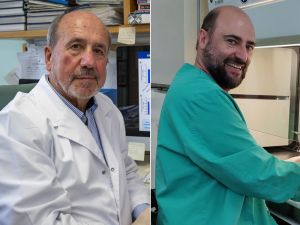El CSIC colabora con la empresa biotecnológica española Biofabri, perteneciente al grupo Zendal, para producir la vacuna en condiciones de uso en seres humanos. El siguiente paso es la solicitud del permiso a la Agencia Española del Medicamento para los primeros ensayos clínicos, fases I/II, que podrían iniciarse en unas semanas.
“Hemos observado que el candidato vacunal MVA-CoV-2-S genera una respuesta inmunitaria robusta con producción de anticuerpos neutralizantes y activación de linfocitos T en ratones”, explica Mariano Esteban, que dirige el laboratorio de poxvirus y vacunas del Centro Nacional de Biotecnología (CNB-CSIC).
“Hemos descrito que la vacuna confiere una protección del 100% contra el SARS-CoV-2 en un modelo de ratón humanizado susceptible a la infección por SARS-CoV-2, lo cual es muy importante”, como subraya Juan García Arriaza, investigador del grupo.
En esta ocasión, el virus MVA ha sido modificado para expresar la proteína S completa del SARS-CoV-2, que es la llave que permite la entrada del coronavirus en las células humanas. Incorporada en el vehículo MVA, esta proteína se produce tan pronto como el virus penetra en la célula y es la que enseña al sistema inmunitario cómo debe reconocer al coronavirus real y cómo debe eliminarlo.
Lo relevante de esta investigación es que la vacuna produce altos niveles de anticuerpos IgG específicos frente a la proteína S del coronavirus y a su dominio de unión con la proteína ACE2 que sirve de receptor de las células humanas. Además, las muestras serológicas de los ratones vacunados neutralizaron de forma muy potente al SARS-CoV-2 en cultivos celulares.
El estudio ha demostrado que la administración de una o dos dosis de este candidato vacunal protege al 100% de los ratones humanizados de la enfermedad y letalidad causada por el SARS-CoV-2. Con dos dosis de la vacuna se produce una inhibición completa de la replicación del virus en los pulmones. “Estos resultados demuestran que la vacuna para la covid-19 basada en el vector MVA produce una inmunogenicidad robusta y una eficacia completa en modelos animales, y respaldan su futura aplicación en ensayos clínicos”, indican los investigadores en el artículo del Journal of Virology.
Los investigadores muestran además en el estudio que la vacunación combinada con dos vacunas diferentes, una en primera dosis basada en ácido nucleico (ADN-S) y otra en segunda dosis (MVA-CoV2-S), produce niveles más altos de activación de linfocitos T que la administración de dos dosis de MVA-CoV-2-S, lo que tiene relevancia cuando se pretende incrementar la población de linfocitos T para conseguir respuestas inmunes más amplias y duraderas.
Para definir un mayor espectro de acción de la vacuna y cumplir con los requisitos de las agencias reguladoras para los ensayos clínicos, se están llevando a cabo experimentos de inmunogenicidad y eficacia en el modelo de hámster y próximamente se efectuarán también con macacos. Si todo va según lo previsto, se podrían iniciar las fases clínicas I/II en unas semanas y avanzar posteriormente hacia la fase clínica III.
La biotecnológica Biofabri está fabricando los lotes GMP (Good Manufacturing Procedures, por sus siglas en inglés) que serán usados en dichas pruebas clínicas y ya tiene definido el proceso industrial para la fabricación de lotes comerciales tan pronto como la fase de desarrollo clínico concluya.
Juan García-Arriaza, Urtzi Garaigorta, Patricia Pérez, Adrián Lázaro-Frías, Carmen Zamora, Pablo Gastaminza, Carlos Del Fresno, José M. Casasnovas, Carlos Óscar S. Sorzano, David Sancho & Mariano Esteban. COVID -19 vaccine candidate s based on modified vaccinia virus Ankara expressing the SARS -CoV -2 spike induce robust T - and B -cell immune responses and full efficacy in mice. Journal of Virology. DOI: 10.1128/JVI.02260-20






